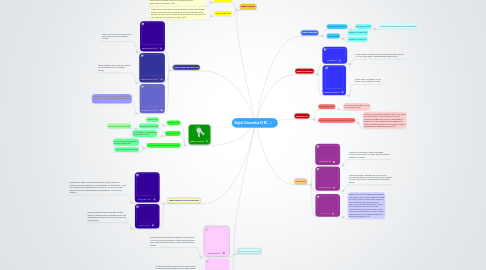
1. Digital Communication
1.1. Facebook (RC)
1.1.1. Facebook is the number one digital communication. It is an online communication system where people from around the world can communicate with their friends.
1.2. Gmail (RC)
1.2.1. Gmail is an email account from Google. Gmail is used a lot around the world by many people.
2. Digital Literacy
2.1. Young People (FE)
2.1.1. Usually, having grown up in a digital world, young people know how to operate a computer and navigate the internet, as well as using several programs such as Microsoft:Word or OpenOffice:Powerpoint. (FE)
2.2. Older People (FE)
2.2.1. Older people have grown up in different situations to younger people. With a lack of knowledge of later technologies, older people are often more clueless around computers, and may fall into traps such as trojans or scams. (FE)
3. Digital Rights and Responsibilities
3.1. Copyright (RC)
3.1.1. Copyright is illegal. Copyrighting movies, songs, videos of Youtube and also plagiarism is copyrighting of the internet. If you burn songs or movies that aren't yours our you don't have any rights to it is also copyrighting even though it's not from the internet.
3.2. Privacy (RC)
3.2.1. Privacy is needed on the internet. Photos, videos of other people is allowed but you do need their permission before you spread the photo/video.
4. Digital Health and Wellness
4.1. Resting Eyes (RC)
4.1.1. Every 30 minutes you should rest your eyes from the computer screen
4.2. Sitting Properly (RC)
4.2.1. When sitting at the computer, always sit up straight and don't always slouch
4.3. Computer TIme (FE)
4.3.1. Spending too long at the computer without breaks can cause eye and health problems. (FE)
5. Digital Security
5.1. Antivirus (FE)
5.1.1. Firewall (FE)
5.1.2. Blocking Scams (FE)
5.1.2.1. Don't fall for a scam! (FE)
5.2. Passwords (FE)
5.2.1. Don't make your password 'PASSWORD' (FE)
5.3. Protecting Personal Information (FE)
5.3.1. Don't show your address or phone number (FE)
5.3.2. Don't reveal your age (FE)
6. Digital Etiquette
6.1. Being Courteous (FE)
6.1.1. Being Polite (FE)
6.1.1.1. Treat others as you would be treated (FE)
6.2. Respect (FE)
6.2.1. Respect of Race (FE)
6.2.2. Respect of Age (FE)
7. Digital Access
7.1. Most People (FE)
7.1.1. Nearly everybody has access to a computer (FE)
7.2. Poor People/Disadvantaged People (FE)
7.2.1. If you're in a disadvantaged situation, you might not have access to a computer at all. This means you might have a lack of knowledge or resources, or you might not have experience with computers, therefore you might not have a knowledge of digital citizenship (FE)
8. Digital Commerce
8.1. Ebay (RC)
8.1.1. Many people use ebay to buy things from other people. It is an online shop of things people want to sell.
8.2. Target Online (RC)
8.2.1. Online Shop of Target- To buy things from Target but online
9. Digital Law
9.1. Stealing (RC)
9.1.1. Stealing on the web is illegal. Uploading movies, music videos or songs that you haven't payed for is illegal.
9.2. Hacking (RC)
9.2.1. Hacking is illegal. Hacking can cause a lot of problems between different people. Many people can hack into emails, Facebook and many other things.
9.3. Piracy (FE)
9.3.1. Piracy is the act of illegally downloading or burning a film or game without paying for it first. Piracy is in fact very common, lots of people own pirated films or games. The problem with piracy is that the companies who produced the film/game don't get any money for the copy that was pirated. If everyone was a digital pirate, then film/game industries would be pointless. (FE)
